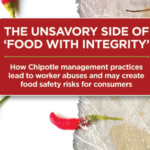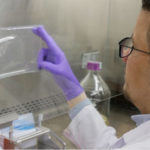The National Consumers League (NCL) published a report claiming that Chipotle Mexican Grill’s management style could lead to more food safety issues for the Chipotle chain. NCL interviewed 47 workers at 25 stores in New York City to create the report, along with analysis of corporate filings, press reports, and other publicly available documents. Chipotle acknowledges that the company’s business model puts the company at relatively high risk for food-borne illness due to the emphasis on “fresh, unprocessed produce and meats, the reliance on employees cooking with traditional methods rather than automation, and avoidance of frozen ingredients. The management bonus...
Andrea-M
Andrea-M
A study published in Pathogens (2019, 8(4), 218) describes the work of a research team from Flinders University in Adelaide, Australia, that developed a method to remove Salmonella Typhimurium (ST) from eggshells without effecting the egg’s usability and quality. The research investigated the effect of pH and temperature on the survival of Salmonella Typhimurium (ST) in peptone water (PW) and mayonnaise. Survival was significantly (p < 0.05) improved at 4 °C. In both mayonnaise and PW, following 24 h, there was no ST growth at pH 4.2. Resuscitation of ST was rapidly observed at 4 °C while complete inactivation was...
Doug-B
An article was published in Chemistry World describing a test developed at the University of California, Irvine to diagnosing bacterial infection and whether the bacteria contain a variety of antibiotic resistance genes. The test is sensitive (10–100 times better than existing methods) and provides the results within an hour. The assay can analyze whole blood and uses the polymerase chain reaction. Very interesting development, soon, this method might be adapted to the food industry.
Andrea-M
A novel antimicrobial film that could be used to help reduce the risk of Salmonella, Listeria and pathogenic E. coli in food products was developed at Penn State University. The composite film was created by the bonding of an antimicrobial layer to conventional, clear polyethylene plastic typically used to vacuum-package foods such as meat and fish. The antimicrobial layer of the film is comprised of a pullulan-based biopolymer produced from starch syrup, infused with Lauric arginate. The pullulan film slows the release of the antimicrobial, disbursing it at a predictable rate to provide continuous bacteria-killing activity. Shiga toxin-producing E. coli,...




